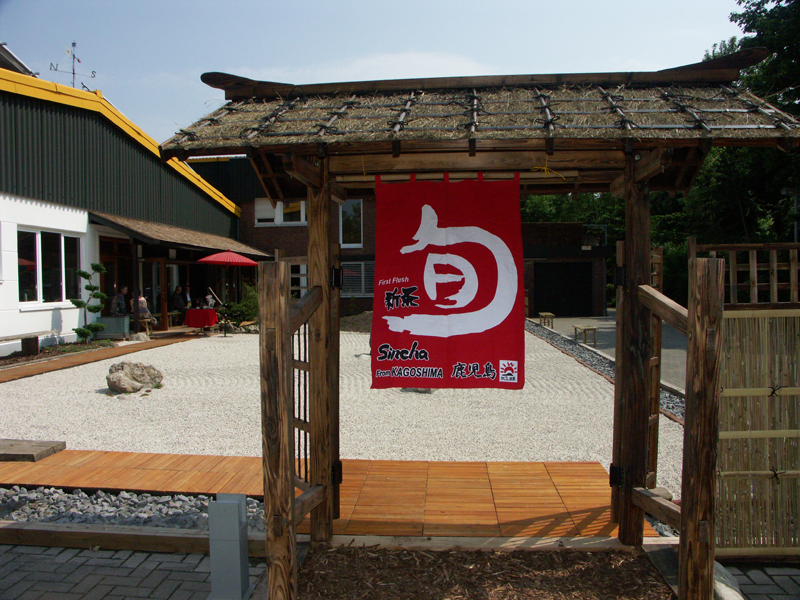
Shincha Fest in Diepholz, Northern Germany
On Saturday, May 21, we set out at 5 a.m. to the Shincha Fest organized by our German partners from Keiko Shimodozono. This event was a celebration of both the arrival of so-called “new tea” (shincha) from Japanese First Flushes and the opening of new company premises in the former skin factory.
Diepholz is a small quiet town, with not much happening. Nonetheless, you will find there and in the vicinity three companies dedicated to the production of organic food. For Keiko, it is obviously teas and tea sweets, the other fairly big companies – whose products we already know from the Czech market – are Lebensbaum and Allos.
The main guests at the Shincha Fest were the President and Director of Shimodozono, Mr. Yutaka Shimodozono and Mr. Matsuzaki. Since 1962, Shimodozono Co. has been dedicated to processing and producing excellent Japanese teas both for domestic and foreign markets. Other guests included business partners and representatives of Keiko, and us. The next day was open for the general public.
Old factory
Large one-storey, newly reconstructed factory is an ideal environment for green tea. It is entered through a Japanese garden and the entire interior is decently inspired by Japanese culture. Publicly accessible rooms include a show room, a sort of a dining room with a part with tatami, and up to now unused big cargo hall, ideal for organizing of cultural events.
In the show room, visitors can have various beverages from matcha tea dust or simply green tea and watch teapots, cups and other accessories on display.
We were first welcomed with a brew of fresh shincha and then we took a tour through the factory, we also saw a brand new Japanese machine for matcha grinding. Due to slow grinding between stone wheels, which helps preserve vitamins and active substances in the tea, it only produces 30 grams of tea dust per day. Then we were invited for a snack (one of the main ingredients in the delicacies was – as a matter of course – matcha) and then Mr. Shimodozono spoke about the current situation in Japan and its impact on tea production.
Aracha degustation
After a short break, we were invited to degustation lead by Japanese guests. We tasted Aracha tea samples from various tea plant varieties. As a matter of course, all teas were from the Kagoshima region. We are listing these varieties here for reference: Surugawase, Yumekaori, Hatsumomiji, Sayama kaori, Asanoka, Yabukita and Yutaka Midori. The Shincha of this year comes from Yutaka Midori.
Mr. Shimodozono always brewed teas in cups for three minutes, during seeping we went round the liquors with stainless sieves to take the brewed tea and smell it for aroma. Then the leaves were returned back to the liquor, avoiding any transfer of leaves to the next tea. Then we tested teas using spoons. Another round of degustation took place from the kyusu teapots. Tea was brewed for three minutes with water which ideally boiled for 10 minutes to get rid of chlorine.
The most important feature for tea sorting is the colour of the liquor and its taste. After plucking, tea leaves are hot-steamed and dried to 7 – 8% humidity. The resulting product is the so-called Aracha, i.e. tea containing stems and all parts of the tea leaf. Aracha is then sorted by quality. All teas are then produced from mixtures of various types of Aracha. For Shincha, tea is directly processed, the remaining crude tea (Aracha) is stored in cooling containers at a temperature of -17 °C and used for the production of other types of tea throughout the year. Processed teas in final stages have about 3 % content of water. Shincha has slightly higher moisture content, thus its shelf life is only several months. Though, it may be considered really fresh for several weeks only.
Japanese culture
Later in the afternoon, we saw the tea ceremony held by Alvin from Norimberk and in the evening we were invited to a “tea” dinner. Chef Oliver described how he prepared various courses. For all of them, he used either tea dust or tea leaves. It was topped with a dessert with strawberries and matcha cream. Yummy…
In the evening, we moved to a big hall, where a stage was set up for the Masa Daiko group dedicated to the art of Japanese drumming. It was a benefit concert whose proceeds were donated to the Japanese Red Cross. The concert was attended by at least 150 locals and everybody was absolutely fascinated by the impressive rhythms.
We brought home several first boxes of Shincha Keiko, more will follow at the end of the month. This year, loose tea will also be available, thus the Japanese tea lovers will be able to buy 10-gram samples as well.
Long live Shincha …






















































